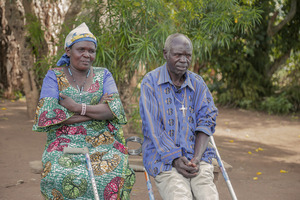share

Emmanuel and Binega using their crutches to work in their garden. | © Infomercial Media / HI
More than 135,000 refugees live in Kyangwali camp in western Uganda. They include Emmanuel, a man who has faced many hardships in his life.
In the Kyangwali refugee camp, more than 20,300 people are living with disabilities, and one in two families has at least one disabled member. HI has provided mental health support as well as physical and functional rehabilitation services to more than 2,300 people, notably in the form of physical therapy sessions and mobility aids, such as walking sticks and wheelchairs.
Emmanuel Ukar, aged 72, comes from the Democratic Republic of Congo. For the last five years, he has been living as a refugee with his wife Binega Aromborach in Kyangwali camp in the west of Uganda. Since leaving the DRC, his life has been marked by bereavement. Emmanuel is the fifth child in a family of fifteen brothers and sisters, only five of whom are still alive – but he has no news of any of them. Fate has indeed dealt Emmanuel a very cruel hand, as he has also lost all nine children from his first marriage.
"I can't even begin to describe the pain I’ve felt losing so many loved ones. I’d even begun to believe that I was cursed. Why does misfortune continue to strike? Even here in Uganda, I’ve had to face adversity. I developed a physical disability that prevented me from living and working as I used to.”
When he arrived in Uganda, Emmanuel fell into a ditch and broke his leg. After the accident, he began to feel pain that soon prevented him from working and supporting his family. The ordeal was difficult for the couple. His wife would belittle him and make him stay in bed, which made his symptoms worse.
 Emmanuel heard about HI at the community support group meetings he attended to help relieve his stress. However, despite these meetings, Emmanuel was still feeling depressed, so he was referred to HI's teams of psychologists and physical therapists. He was given crutches and did exercises to learn how to use them and reduce his pain.
Emmanuel heard about HI at the community support group meetings he attended to help relieve his stress. However, despite these meetings, Emmanuel was still feeling depressed, so he was referred to HI's teams of psychologists and physical therapists. He was given crutches and did exercises to learn how to use them and reduce his pain.
Emmanuel also attended individual sessions with an HI psychologist who gave him advice on sleep quality and techniques for breaking the cycle of inactivity and isolation. He was helped to challenge and change his negative beliefs about himself, others and his environment. He also took part in couples sessions with his wife to help them resolve their conflicts.
Binega also received individual psychosocial support, as well as exercises with a physical therapist to relieve her own physical pain. She was also given crutches to help her get around.
"The counselling sessions were very useful, as they helped me to understand what was happening to me. I was welcomed into a safe, non-judgemental space, where I was free to express my thoughts and feelings and work on resolving my conflicts. Thanks to the sessions, I noticed a real change. I've started to see life in a positive light again, and my relationships with my wife and others have greatly improved," says Emmanuel.
Emmanuel is feeling much better today. He has gone back to work, opening a business with the financial support he received from the Ugandan Red Cross, to which HI had referred him.
The InCharge project, implemented in Uganda between August 2021 and July 2024, was led by Medical Teams International. A total of over 5,100 people were supported in the Kyangwali and Kyaka camps, of which 1,400 through rehabilitation and 3,700 through mental health support.








HI is an independent and impartial aid organisation working in situations of poverty and exclusion, conflict and disaster. We work alongside people with disabilities and vulnerable populations, taking action and bearing witness in order to respond to their essential needs, improve their living conditions and promote respect for their dignity and fundamental rights.
HI is an independent and impartial aid organisation working in situations of poverty and exclusion, conflict and disaster. We work alongside people with disabilities and vulnerable populations, taking action and bearing witness in order to respond to their essential needs, improve their living conditions and promote respect for their dignity and fundamental rights.